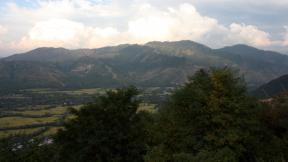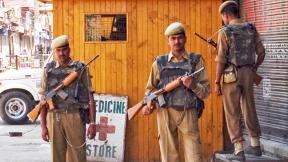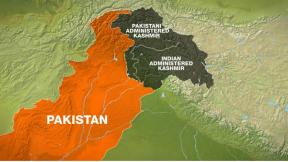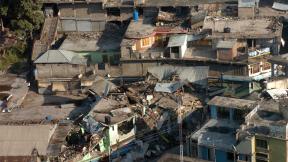
Human rights abuses have been a part of the campaign of the Indian army against Muslim Kashmiris, particularly after 1990. The oppression has been manifested in the following types of human rights abuses: “disappearances”, torture, rape and molestation of Muslim women.
Below are incidents from Amnesty International, a worldwide human rights movement independent of any government, political ideology, economic interest or religion, the Kashmir Quarterly, a publication of the Kashmiri-Canadian Council, and United States Department of State human rights reports. Other sources have occasionally been used as well.
Deaths
“In its 1996-1997 report, the NHRC [National Human Rights Commission] stated that 1,375 armed forces personnel had been killed and 2,237 injured in Jammu and Kashmir between January 1, 1988 and April 30, 1997.
In 1997 the totals were 918 civilians, 189 security force personnel and 1,114 militants, according to reliable press reports.
-U.S. Department of State, India Country Report on Human Rights Practices for 1998. Released by the Bureau of Democracy, Human Rights, and Labor, February 26, 1999.
-According to the Kashmiri-Canadian Council, 47,455 Kashmiris have died since October 1989.
Executions
“General S. Padmanabhan said that the (Indian) Ministry of Defense had issued orders to troops posted in Jammu and Kashmir to shoot on sight any of the 300 "infiltrators" it believed to be currently fighting in Jammu and Kashmir. Referring to some 1,000 Kashmiri as "hard core guerrillas", he said that if they renewed their subversive activities, "we will eliminate them, too".
-Amnesty International press release, October 15, 1996
“The [Indian] government's disregard for human rights in Jammu and Kashmir means in practice that some 200 people reportedly died in custody in Jammu and Kashmir last year and that the whereabouts of some 500 to 600 "disappeared " persons continue to be unknown. The arbitrary arrests of people suspected to sympathize with armed opposition groups also continues to be reported.”
-Amnesty International press release, August 14, 1998
Use of excessive force and violations of humanitarian law in internal conflicts
“Government forces continue to commit serious violations of humanitarian law in the disputed state of Jammu and Kashmir. Between 350,000 and 400,000 army and paramilitary forces are deployed in Jammu and Kashmir.
The Muslim majority population in the Kashmir Valley suffers from the repressive tactics of the security forces.
Under the Jammu and Kashmir Disturbed Areas Act, and the Armed Forces (Jammu and Kashmir) Special Powers Act, both passed in July 1990, security forces personnel have extraordinary powers, including authority to shoot suspected lawbreakers and those disturbing the peace, and to destroy structures suspected of harboring militants or arms.”
-U.S. Department of State, India Country Report on Human Rights Practices for 1998. Released by the Bureau of Democracy, Human Rights, and Labor, February 26, 1999.
Rape
-According to the Kashmiri-Canadian Council, 6,300 Kashmiri women have been raped. Rape is a method used to attack Kashmiri women who Indian security forces accuse of sympathizing with the militants. By raping these women, the security forces are aiming to punish and humiliate the entire community.”
-Human Rights Watch
“In Singhpur village, Occupation Forces barged into the house of Abdul Ahad and forcibly took his wife and daughter to a military camp where they were gang-raped.”
-Kashmir Quarterly, November 8, 1997
“Disappearances”
”Since 1990, some 700 to 800 people have “disappeared” after being arrested by police or armed or paramilitary forces. The victims have included men of all ages, including juveniles and the very old, and all professions, including businessmen, lawyers, laborers and many teachers. Almost all of them appear to be ordinary citizens picked up at random, without any connection to the armed struggle.“
-Amnesty International report, “'If they are dead, tell us'-'Disappearances' in Jammu and Kashmir”, February 1999
“It is virtually impossible for relatives of the ‘disappeared' in India's troubled northern state to trace their relatives or find redress from the institutions supposed to protect and promote human rights, including police, security forces, the courts and statutory human rights bodies, the report argues.”
-Amnesty International press release, February 22, 1999
Torture
“In the month of Ramadan, besides being physically tortured, Kashmiris are prevented from taking their early morning meal before starting their day of fast. They were also prevented from participating in the late evening prayers. A reign of terror was let loose in Srinagar where people were ordered out of their homes at morning meal time.”
-Kashmir Quarterly, January 14, 1997
“Indian Forces killed six citizens, torched two mosques, 15 shops and seven houses in various parts of the valley. As a result, there were protest demonstrations in many cities. Troops desecrated the central Srinagar Mosque and tortured worshipers whom they found inside.”
-Kashmir Quarterly, October 12, 1997
“In Banihal, Indian army personnel raided a house and molested the wife of Ghulam Rasool. Other members of the family were whipped. A three-year-old child became unconscious as a result of the horrible beating.”
-Kashmir Quarterly, December 2, 1997
Impunity
“Impunity has been and remains a serious problem in Jammu and Kashmir. Security forces have committed thousands of serious human rights violations over the course of the conflict, including extra judicial killings, disappearances, and torture.
Yet, during the period January 1, 1990 to June 30, 1997, only ten members of the security forces were tried and sentenced to 10 or more years imprisonment for violations of human rights in Jammu and Kashmir and Punjab (separate figures for Jammu and Kashmir are not available.)
An additional fourteen received sentences of between 1 and 10 years, and 73 received sentences of less than 1 year. During the same period, 42 members of the security forces were dismissed or compulsorily retired and 20 were reduced in rank or seniority following conviction on charges of human rights violations. Seventy-one members of the security forces who are alleged to have committed human rights violations are currently under investigation, according to the Ministry of Home Affairs.
Scrutiny by the NHRC and international human rights organizations, when permitted, and the persistence of individual magistrates have resulted in greater accountability of the security forces in Jammu and Kashmir over the years.
However, the vast majority of violations by security forces have gone and continue to go uninvestigated and unpunished.”
-U.S. Department of State, India Country Report on Human Rights Practices for 1997. Released by the Bureau of Democracy, Human Rights, and Labor, January 30, 1998.
"A historic Art gallery of KPs plundered" by Veerji.Wangoo - Own work. Licensed under Creative Commons Attribution-Share Alike 4.0 via Wikimedia Commons - http://commons.wikimedia.org/wiki/File:A_historic_Art_gallery_of_KPs_plundered.jpg#mediaviewer/File:A_historic_Art_gallery_of_KPs_plundered.jpg








Comments
kashmir rights human
very good
Location
Add new comment